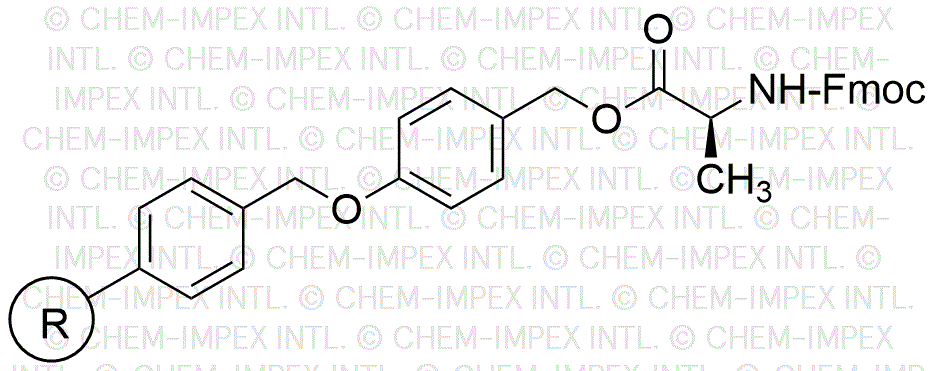Fmoc-L-alanine 4-alkoxybenzyl alcohol is widely utilized in research focused on:
- Peptide Synthesis: This compound serves as a protective group in solid-phase peptide synthesis, enhancing the efficiency and selectivity of peptide formation.
- Drug Development: It plays a crucial role in the design of peptide-based therapeutics, allowing researchers to create more stable and effective drug candidates.
- Bioconjugation: The compound is used in bioconjugation processes, facilitating the attachment of biomolecules to surfaces or other molecules, which is essential in diagnostics and targeted drug delivery.
- Material Science: It finds applications in the development of functional materials, such as hydrogels, which can be used in tissue engineering and regenerative medicine.
- Analytical Chemistry: This chemical is employed in analytical techniques to improve the detection and quantification of various biomolecules, aiding in research and quality control.
Informations générales
Propriétés
Sécurité et réglementation
Applications
Fmoc-L-alanine 4-alkoxybenzyl alcohol is widely utilized in research focused on:
- Peptide Synthesis: This compound serves as a protective group in solid-phase peptide synthesis, enhancing the efficiency and selectivity of peptide formation.
- Drug Development: It plays a crucial role in the design of peptide-based therapeutics, allowing researchers to create more stable and effective drug candidates.
- Bioconjugation: The compound is used in bioconjugation processes, facilitating the attachment of biomolecules to surfaces or other molecules, which is essential in diagnostics and targeted drug delivery.
- Material Science: It finds applications in the development of functional materials, such as hydrogels, which can be used in tissue engineering and regenerative medicine.
- Analytical Chemistry: This chemical is employed in analytical techniques to improve the detection and quantification of various biomolecules, aiding in research and quality control.
Documents
Fiches de données de sécurité (FDS)
La FDS fournit des informations de sécurité complètes sur la manipulation, le stockage et l’élimination du produit.
Spécifications du produit (PS)
Le PS fournit une description complète des propriétés du produit, notamment sa composition chimique, son état physique, sa pureté et les exigences de stockage. Il détaille également les plages de qualité acceptables et les applications prévues du produit.
Certificats d'analyse (COA)
Recherchez des certificats d'analyse (COA) en saisissant le numéro de lot du produit. Les numéros de lot et de lot se trouvent sur l'étiquette d'un produit, après les mots « Lot » ou « Lot de fabrication ».
Numéro de catalogue
Numéro de lot/série
Certificats d'origine (COO)
Ce certificat d'exploitation confirme le pays dans lequel le produit a été fabriqué, et détaille également les matériaux et composants utilisés et s'il est issu de sources naturelles, synthétiques ou autres sources spécifiques. Ce certificat peut être requis pour les douanes, le commerce et la conformité réglementaire.
Numéro de catalogue
Numéro de lot/série
Fiches de données de sécurité (FDS)
La FDS fournit des informations de sécurité complètes sur la manipulation, le stockage et l’élimination du produit.
DownloadSpécifications du produit (PS)
Le PS fournit une description complète des propriétés du produit, notamment sa composition chimique, son état physique, sa pureté et les exigences de stockage. Il détaille également les plages de qualité acceptables et les applications prévues du produit.
DownloadCertificats d'analyse (COA)
Recherchez des certificats d'analyse (COA) en saisissant le numéro de lot du produit. Les numéros de lot et de lot se trouvent sur l'étiquette d'un produit, après les mots « Lot » ou « Lot de fabrication ».
Numéro de catalogue
Numéro de lot/série
Certificats d'origine (COO)
Ce certificat d'exploitation confirme le pays dans lequel le produit a été fabriqué, et détaille également les matériaux et composants utilisés et s'il est issu de sources naturelles, synthétiques ou autres sources spécifiques. Ce certificat peut être requis pour les douanes, le commerce et la conformité réglementaire.

